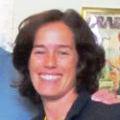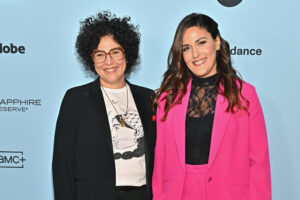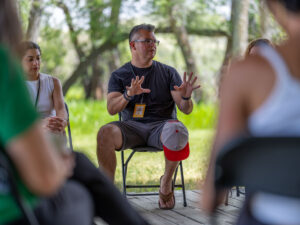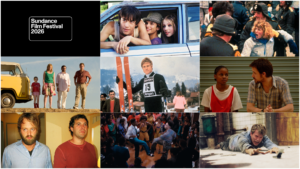Julia Meltzer, Director, The Light In Her Eyes
September 4, 2013
I’m on the plane to Seattle and feeling ready for four days of screenings with the FILM FORWARD program. Looking out the window over California, the skies are clear. It has been hot, hot, hot in LA, but the captain tells us that in Seattle it’s raining. Not pouring yet, just a drizzle. The heat has also been ratcheting up over Obama’s move to do something in Syria, but only with congressional and international backing. Will the Republicans and Democrats breach the ever-present bi-partisan divide and head off to war? Very hard to say at this moment what will happen.
The Syria that we have seen in the news over the last 2 years was not the Syria that I knew or experienced. Our film, The Light In Her Eyes, is about a different Syria than the one that features shells of buildings, YouTube videos of dead babies, and opposition soldiers eating the lungs of the enemy. Our film is about Syria before the uprising—a Syria that most people don’t know about. It is about life within the women’s side of a mosque in a conservative community of Sunni Muslim women who teach girls to take education seriously and to participate in learning about both religious and secular ideas.
Arriving in Seattle, I get into a taxi from SEATAC airport to the hotel. Pal Tung, a Sikh man, is my driver. He asks what I will be doing here in Seattle and I give him a short explanation of our film. I also ask him if there is a large Sikh community here in the Pacific Northwest. He tells me that since September 11th, many Sikh have relocated to Seattle in order to be closer to Canada. I had no idea about this migration pattern. I wonder if the Sikh feel more comfortable closer to our northern and sometimes more kindly neighbor? After September 11th, many Sikhs in the US are being mistaken for Taliban. But, a bit of history, he tells me that in the 12th century, many Muslims killed Sikhs in India. The history is deep and complicated.
And he goes on–the only way to cure fundamentalism in religion is through education. I almost leap into the front seat. That’s the point of our film, Pal! Educating girls about religion and encouraging secular education so their children will be educated. Pal then tells me a beautiful thing. He has two sons, age 22 and 24. He said that whomever they love or choose to marry, she must be educated. And if she doesn’t have an education, he is willing to pay for it. He will work more hours as a taxi driver in order to be sure that his future daughter in law is educated. I love this guy. How lucky are his sons and the lucky girls who they choose to marry?
Pal believes that one of the reasons that he is only a taxi driver is because his mother was not educated. Education was valued by his father, but it is the mother who raises and spends the lion share of the time with her children. He was lucky to marry an educated woman who made sure that his sons got a good education.
And all too soon we pull up to the hotel and I say goodbye to Pal.
And later that afternoon we are off to Tacoma and the Grand Cinema. The Grand Cinema is the type of place that all cinephiles know and love. Movie posters line all the walls from mainstream to low-budget features all in one place. The theater curtain is classic red velvet and lights line the aisle so you can see if you arrive late to the film. The theater is packed with dedicated movie-goers all here to watch a film about Syria, but NOT about the uprising.
As we open the film, I ask the audience to throw out ideas about a picture of Syria before the uprising. What was this place like, in their imaginations, because most have not been there. I can tell immediately that we have an educated audience. People respond with answers ranging from—“Syrians are a very hospitable people”, and “the Assad regime are members of a minority sect ruling over a majority Sunni population” and even, “Damascus is a beautiful city.” These are none of the responses that I usually receive from an American audience who often can’t place Syria on a map and then confuse it with Saudi Arabia.
While the film is playing, Jackie and Meredith and I wander down to a pizza restaurant a few blocks away. Tacoma is a small industrial town with a waterfront and, at least in the few blocks that I have traveled in this city, it has a great feel. I sense that the residents here care about their town and that there is a small and thriving arts community.
We arrive back at the Grand Cinema just in time for the last scene to play and for the Q&A to start. Many audience members stay for the Q&A which is moderated by Professor David Coon and Terese Saliba from Evergreen College. Terese’s family comes from Lebanon and she has spent time living and teaching in Palestine. The focus of her work is on Arab Literature, women in the Middle East, and she is clearly intimately familiar with the complicated issues around representing this particular group of people. The Q&A is engaged and lively and as we wrap up, one gentleman in the audience who is a journalist says,
“As I was watching the film I was thinking–why didn’t you press harder, ask more difficult questions of your main character? And then as the film was ending, I realized that this film is really told from the perspective of your main characters and how they live. It is not journalism, it is cinema, and it has allowed me to be there and experience life from their viewpoint for a little while.”
Thank you, audience member! And another woman comes up to me afterwards and says,
“I always have thought that it must be difficult to be born a girl in that part of the world. However, your film has shown me how much joy and pleasure there is in the lives of these little girls in that mosque. My perspective is changed.”
Seems that the audience here in Tacoma has taken away a new perspective on Syria. FILM FORWARD in action.







